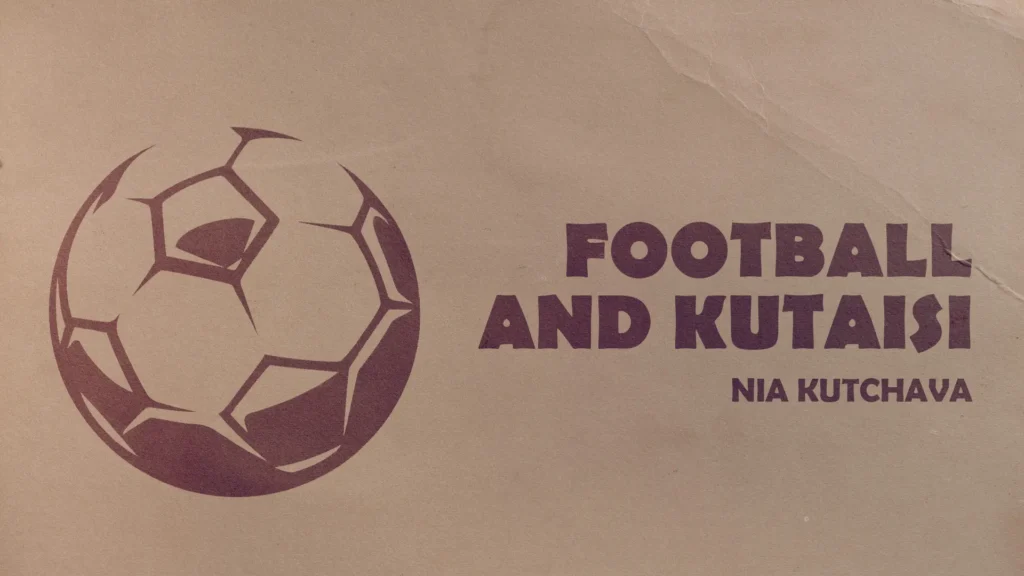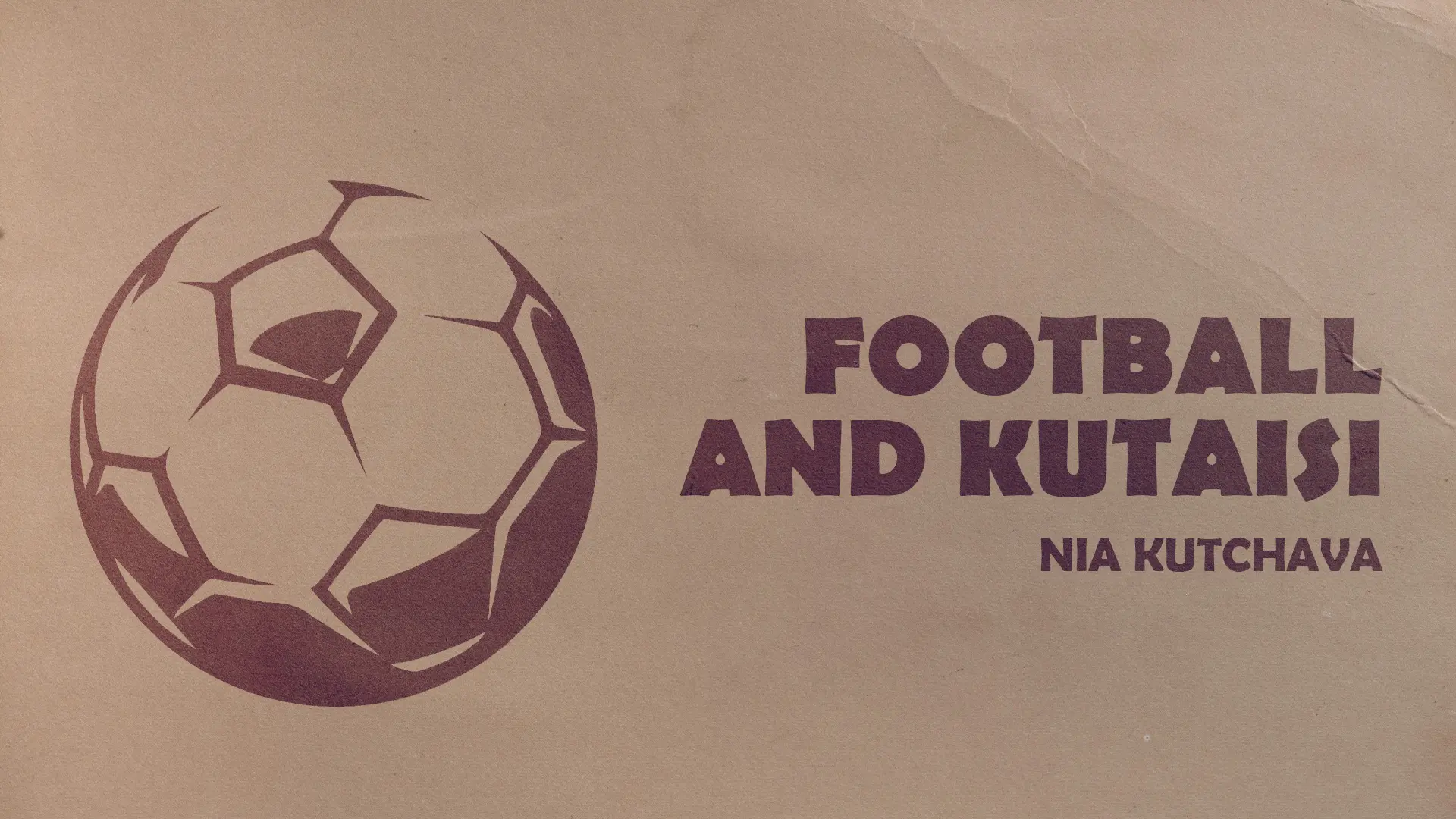
Author: Nia Kuchava
On June 26, 2024, one of the most significant events for Georgian and European football became an indelible part of collective and individual memory. A simple statement, in formal language, describing how the Georgian national team reached the Round of 16 in the UEFA European Championship, marked either the beginning or end of various adventures and stories for different people. It became a defining part of a larger narrative, a piece of the mosaic that skillfully connects and completes the whole picture. On this day, Kutaisi faced numerous challenges due to heavy rains, flooding, and electricity issues—problems that concerned the city. Yet, amidst these worries, one thought persisted in many minds: where and how to watch today’s game.
If we broaden our horizons and thinking, if we gain courage and bravery, at the end of our scattered thoughts, we might see at least one strange corner foretelling Victory. The continuous relevance of our country’s name in one of the most prestigious football tournaments in the world grants our nation a legitimate participant status. To demonstrate its worth and fighting spirit, it must exhibit unwavering courage, psychological readiness, a love for this outstanding game, and, above all, bravery and faith in victory brought by unexpected joy. Following this, there was a grand celebration, the roar of people walking through the city center, Georgian flags displayed from car windows, and lights streaming from balconies, confirming the presence of at least one person full of hope in the heart of every home.
The above description reflects the story of one night in our city, experienced by its residents, involving numerous emotions, rational and irrational behavior, and strange events, which we will attempt to question and answer in this article. First and foremost, what compels completely unknown individuals, players on the football field, and other spectators to view the same event with entirely identical emotions and attitudes? Why do fans of Kutaisi’s “Torpedo” and Tbilisi’s “Dinamo,” who are rivals, unanimously agree that they must unite for one goal at the national team level and equally celebrate a goal scored in a specific moment, both in the tournament host country and at home?
Suppose a goal scored or conceded by their favorite club evokes entirely opposite feelings among them in one instance. Why are they willing to overcome their differences, regionalism, rivalries, and club traditions to support the Georgian National Team unanimously? More broadly, how can any sport perfectly express and embody a marker of identity, or conversely, how can football take root and manifest itself in the existence and life of any city? These contradictory relationships and emotional anomalies in the interactions between Kutaisi and football will be directly observed in the following discussion.
Firstly, we need to think of football fans as imagined communities. The idea of imagined communities belongs to the renowned political scientist Benedict Anderson, who created significant works on the origins of nationalism and the sense of unity that arises from it. One of his most important discoveries was imagined communities. An imagined community consists of people who do not know each other, have not communicated with each other, but make collective decisions on behalf of one nation and people, calling themselves a unity and distinguished by uniformity and uniqueness of identity markers.
The same principle can be applied to football fans. Barcelona fans live in different parts of the world, but in the temporal reality, that is, in the minute and second they follow Barcelona’s game, they form an imagined unity with shared characteristics, thereby distinguishing themselves from imagined “others”. According to Anderson, the origin of nationalist sentiments is closely linked to the process of industrialization, as industrialization made people, through their specialization and labels, part of a much larger unity than the groups that existed before. If in the past a person living in a specific region of France could feel no emotional attachment or connection to someone from another region, their union in the working class or a trade union reduced regional differences and created common difficulties and problems.
This also explains why fans of River Plate and Boca Juniors celebrate Argentina’s national team’s victory in the World Cup on the streets of Buenos Aires even after the most intense Superclásico. In this case, regional differences become differences in club relations. Similarly, Fans of “Torpedo” Kutaisi and “Dinamo” Tbilisi unite when it comes to the national team and the national pride of Georgia.
Industrialization, novels, and newspapers broadened people’s consciousness, and the boundaries of their thinking and imagination, allowing them to see themselves as part of something much greater than themselves. It is also crucial that this fact is inscribed in time by the calendar. Anderson spoke of the changing perception of time as one of the important factors necessary for the rise of nationalism, specifically that people used to experience the past and present simultaneously in the present. Thanks to the creation of precise dating mechanisms in newspapers and calendars, people began to perceive specific moments differently.
Representatives of one nation or football fans are part of a collective “I” at a specific time, simultaneously watching a football match, and this coexistence in time strengthens the sense of unity of the imagined community. Anderson’s formula fits football very well and further confirms that football undoubtedly reflects national identity. For example, the relationship expressed by Barcelona and Athletic Bilbao to football globalization is seen by researchers as a reflection of Catalan and Basque nationalism, respectively. Significant differences exist between these clubs, particularly against the backdrop of football globalization. Barcelona has acquired a global identity, while Athletic Bilbao exists by a strictly defined rule that only Basque players can play for the club. Thus, football often reflects nationalist sentiments and movements of specific groups, helping to highlight the characteristics of those groups.
In the above example of Kutaisi, this is also important because, for many fans, the Kutaisi club “Torpedo,” the phrases uttered at the stadium, football philosophy, and approach are very close to the values and attitudes that Kutaisi residents express as a separate group. Rivalry with the capital, the feeling of resisting being perceived as the periphery—the place in the league helps people see their position not only from a football standpoint but also from a political and social perspective. The same can be said at the national team level. For example, in Brazil, the country’s place on the global stage is often perceived through football, which is the reflection that shows its significance and identity. Therefore, it has a self-correcting nature. Football allows its viewers not only to be active participants in the chain of events through fandom but also to observe themselves and their position as a third party.
Discussing the social and political aspects of football, we can understand sociologist Emile Durkheim’s theory of rituals. According to this theory, rituals help people enhance the sense of cooperation and closeness, and they can merge the sacred and the profane into one dimension during the performance of rituals (e.g., the phenomenon of sharing a meal strengthens the sense of unity since, in different cultures and religions, food is an expression of the body. Collective eating brings bodies into one dimension). Football is considered a ritual of modernity. First and foremost, one of the most important features of a ritual is the sense of mysticism, mystery, and transitioning to a new level of consciousness after everyday emotions and thoughts. The excitement caused by this transition is very similar to the euphoria experienced while watching football: people point to the emblem of their favorite club or team, kiss it, shed tears when listening to anthems, or during emotional performances, expressing this unique emotional state and feeling.
If we perceive a match as a ritual, we also explain the strange phenomenon of acceptance and cooperation created in stadiums during games. The role of this cooperation and consensus is emphasized by the fact that in Japan, where football has been actively popularized over the past few decades, advertisements like “The spectator is the twelfth player on the field” were used to increase public participation and awareness of the local league, which bore fruit. The public’s passivity soon turned into full participation and involvement in the performance. According to other theories, football is a kind of simulation of a state of war. Desmond Morris compares the characteristics of football to the traits of a tribal society and offers us important conclusions: the rules in football are analogous to the laws of tribes, territories, and boundaries of tribal settlements are transformed into the designations of team stadiums and internal or external zones in football, taboos are expressed in fouls, opponent injuries, and warnings, penalties serve as a punitive measure that upholds the sense of justice and the demonstrative nature of punishment.
Famous footballers are often made prototypes of heroes, very similar to the figure of a tribal leader. First, a belief in their difficult past and the obstacles they overcame must be created (e.g., the story of a little boy from Rosario, health problems, stories of a tough childhood and poverty), their fighting style must be established (whether they like to achieve their goals individually or as a team player, whether they are humble or arrogant), a distinctive style of triumph demonstration (differences in goal-scoring techniques), their belief in omens, and so on. For football fans, the boundaries of emotional expression and censorship are often blurred, and the main priority becomes the quality of the game displayed by strangers on the field. The reason for such emotional anomalies is precisely that they consider themselves part of something greater, a deeper history and philosophy. This explains why the stars of Argentine football were equated with heroes fighting for freedom, for whom football and Maradona’s “Hand of God” were expressions of revenge, restoring justice, and a real political conflict, fighting English imperialism.
“Torpedo” Kutaisi has won the Georgian championship four times and the Georgian Cup five times, so the successes achieved in the name of Kutaisi football are significant and relevant for many of the reasons mentioned above. After important and tense games, a peculiar interpretation of the events during the game, inaccuracies, or different perceptions of game moments are particularly common in the city. The specific social context and emotional attachment, the emotional connection with the club, determine a special fan culture. In 1951, a match took place between the Dartmouth and Princeton football teams, after which the student newspapers of both universities wrote evaluations of the game. An investigation was conducted on these evaluations, yielding very interesting conclusions: representatives of both universities perceived the same situations differently in the same game, having different views on the teams’ roughness during the game. This study confirms that sports are a social phenomenon inevitably influenced by unique identities and contexts. Emotional attachment in this case turned into two different instances of reality construction. Therefore, football, in turn, expresses local identity and context, but we also create our interpretations and generate a unique experience of understanding and feeling it.
In summary, with the above reflection, we attempted to present both the general characteristics of a global and national phenomenon and its manifestations and expressions in the Kutaisi reality. We tried to respond to and explain many contradictory events and emotional experiences, irrational actions often encountered by football fans, including those from Kutaisi.
